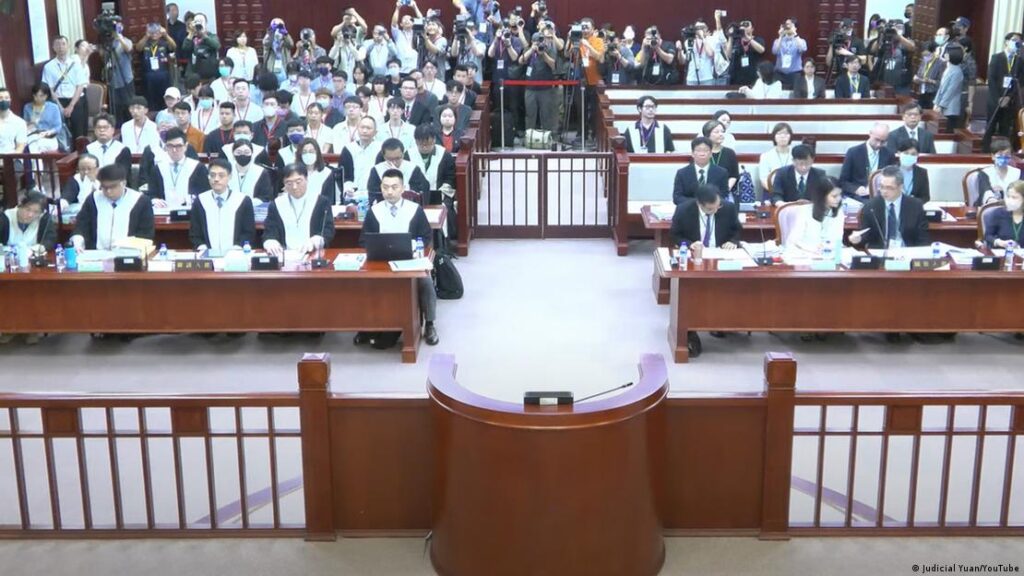
Image: picture alliance/dpa
DW: Will Taiwan abolish the death penalty this year?
- DPP in the Media
- 24 Apr 2024
This article was originally published in Deutsche Welle (DW), 24 April 2024.
A Taiwanese court ruling could lead to the island’s abolition of capital punishment. But given strong public support for the death penalty, the court may have to sail against the wind to reach a consensus.
Taiwan‘s Constitutional Court on Tuesday debated the island’s death penalty and discussed whether it violates the rights guaranteed under the Taiwanese constitution.
The democratic island is known for its strong human rights record and progressive stance on marriage equality and LGBTQ+ rights. In 2019, Taiwan became the first place in Asia to legalize same-sex marriage.
Court challenge sparks heated debate
Beijing considers self-ruled Taiwan to be Chinese territory, and President Xi Jinping has made “reuniting” the democratic island with mainland China a long-running centerpiece of his strategic policy.
Taiwan’s long-awaited debate on the death penalty is considered a historic step that human rights groups believe will decide the future of capital punishment in the democratic island and perhaps further distinguish it from China, which is considered “the world’s leading executioner,” according to a 2022 report by Amnesty International.
While the final ruling on the constitutionality of the death penalty is not expected to be made before the end of September, the debate surrounding capital punishment has become heated.
“It’s been a debate that’s rumbled on for too long [in Taiwan],” Saul Lehrfreund, co-executive director of the Death Penalty Project, an organization that provides free legal representation to those facing the death penalty, told DW. “I’m happy that the court have an opportunity now to consider whether or not the death penalty is constitutional.”
The debate came after Taiwan’s 37 death row inmates, with help from the Taiwan Alliance to End the Death Penalty, a coalition of NGOs and research institutes, petitioned for a constitutional review of capital punishment.
“If we can understand the process of a criminal’s downfall, why do we focus on killing the fallen angel while overlooking the Satan who led them astray?” one of the attorneys told the court.
The defendants, represented by officials from Taiwan’s Ministry of Justice (MOJ), claimed that capital punishment is considered only “as a last resort” which does not violate the protection of the right to life.
Basic rights guaranteed in Taiwan’s constitution “can be restricted within the framework of legal preservation and the principle of proportionality,” MOJ officials added.

What are Taiwanese people saying?
Polls cited by the Taipei Times suggest that a majority of Taiwanese oppose the abolition of the death penalty.
A 17-year-old student, who spoke to DW on condition of anonymity, said that she is in favor of keeping the sentence. “I believe that murder should be punished with the death penalty,” she told DW, adding that it should be given regardless of the factors behind the crime.
Another student, in his 20s, holds a similar point of view. He told DW that since murderers have taken away someone’s life, it should be “a form of equality” for the legal system to do the same.
But for those supporting the abolition of capital punishment, the execution of perpetrators could only offer temporary solace to victims’ loved ones, rather than long-term comfort.
“I think there should be well-established measures for explanations and compensation to the families,” said Mr Hong, a 40-year-old office worker. “It may feel like you have taken revenge at the moment, but in reality, it doesn’t seem to have any lasting impact on the family.”
To what extent should public opinion be considered?
According to a 2022 report by Amnesty International, close to three quarters of governments around the world have abolished the death penalty in law or practice, almost none of which ended the death penalty due to the public demand or support for it, Lehrfreund pointed out.
Rather, he told DW, the public “followed the political lead or the judicial lead” and have eventually accepted abolition.
Human rights groups believe constitutional interpretation could pave the way for formal abolition of death sentences since Taiwan only legalized same-sex marriage after the Constitutional Court ruled the ban on it unconstitutional.
But the MOJ argues that the same-sex marriage and death penalty cases are not comparable because the application of the death penalty relates to criminal policy.
Although Taiwan has taken steps towards abolishing capital punishment, for example it removed mandatory executions for certain crimes, the island may still impose the death sentence for over 50 different crimes, including murder, robbery and drug trafficking.
“Taiwan has said for many years that they’re on a road to abolition,” Lehrfreund told DW. “But my question is, is that road too long politically and that not enough progress has been made politically to move away from the death penalty?”
Hong, who supports the abolition of capital punishment, also believes the issue is often being used as “some kind of political maneuvering.”
“I don’t think it’s going to be easy to reach a consensus,” he said, “because after all, the Constitutional Court has to take into account the majority of the people in [Taiwan].”
The most recent death-row inmate to be executed in Taiwan was Weng Jen-hsien, who had been convicted of murdering six people, including his parents and their caregivers, and was executed in Taipei in 2020.
It was Taiwan’s second execution since President Tsai Ing-wen took office in 2016.
Taiwan’s Constitutional Court is expected to issue its ruling on capital punishment between July and September.
DW’s correspondent Yu-Chun Chou contributed to the report.
Edited by: Keith Walker



















